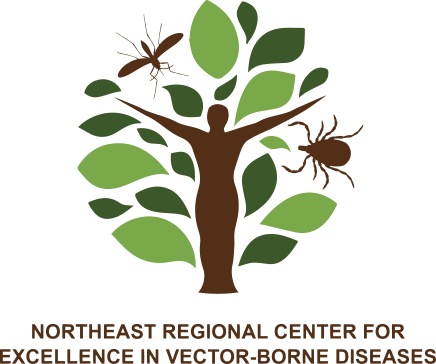MS in Entomology Program Graduates Where Are They Now?
Catch up with our program alumni to learn more about where they are now and how earning a MS in Entomology degree through the NEVBD program at Cornell University is helping them succeed in their careers.
Class of 2020
Erin Hassett, MS
Current Position: Ecology Graduate Student, SUNY College of Environmental Science and Forestry; Syracuse, New York
Thesis: Assessing the Knowledge, Attitudes, Practices, and the Risk of Tick Exposure of Park Visitors on Staten Island, New York (doi.org/10.7298/z3at-x952)
Publication: Hassett E, Diuk-Wasser M, Harrington L, Fernandez P. 2022. Integrating tick density and park visitor behaviors to assess the risk of tick exposure in urban parks on Staten Island, New York. BMC Public Health. 22(1):1602. doi: 10.1186/s12889-022-13989-x
Phurchhoki Sherpa, MS
Current Position: Entomology Research Assistant, Agriculture and Environmental Sciences, Purdue University; West Lafayette, Indiana
Thesis: The Biology and Monitoring of the Invasive Asian Longhorned Tick, Haemaphysalis longicornis Neumann, 1901 (Ixodida: Ixodidae) in the United States (doi.org/10.7298/fpsm-x550)
Publication: Sherpa P, Harrington LC, Piedmonte NP, Wunderlin K, Falco RC. 2021. Optimal collection methods for Asian longhorned ticks (Ixodida: Ixodidae) in the Northeast United States. J Med Entomol. 58(6):2255-63. doi: 10.1093/jme/tjab083
Class of 2021
Lindsay Baxter, MS
Current Position: Entomology Research Support Specialist, Program Coordinator NEVBD Pesticide Resistance Monitoring Program, Cornell University; Ithaca, New York
Thesis: Habitat Associations of a Powassan Virus Focus in Southern Maine (doi.org/10.7298/mwzh-ne68)
Publication: Baxter L, Lubelczyk C, Harrington LC, Meagher MC, Angelico J, Robich RM. 2024. Habitat associations of a Powassan virus focus in southern Maine. Am J Trop Med Hyg. In Press.
Cierra Briggs, MS
Current Position: Testing and Evaluation Entomologist, Harris County Mosquito and Vector Control; Houston, Texas
Thesis: Mosquito Diversity, Arboviral Risks, and Blood Feeding Patterns at the Nashville Zoo at Grassmere (doi.org/10.7298/0344-dr38)
Publication: Briggs C, Osman R, Newman BC, Fikrig K, Danziger PR, Mader EM, Woc Colburn M, Harrington LC, Moncayo AB. 2023. Utilization of a zoo for mosquito (Diptera: Culicidae) diversity analysis, arboviral surveillance, and blood feeding patterns. J Med Entomol. 60(6):1406-17. doi: 10.1093/jme/tjad111
Mervin Cuadera, MS
Current Position: CDC Health Scientist (Data Scientist), CDC Polio Eradication Branch, SIR Team; Atlanta, Georgia
Thesis: Knowledge, Attitudes, and Practices Regarding Tickborne Diseases in Long Island, New York (doi.org/10.7298/pr3e-x437)
Publication: Cuadera MKQ, Mader EM, Greiner Safi A, Harrington LC. 2023. Knowledge, attitudes, and practices for tick bite prevention and tick control among residents of Long Island, New York, USA. Ticks Tick Borne Dis. 14(3):102124. doi: 10.1016/j.ttbdis.2023.102124
Kate Thornburg, MS
Current Position: Entomology Research Technician, Catteruccia Lab, Harvard T.H. Chan School of Public Health; Boston, Massachusetts
Thesis: Assessing Surveillance, Density, and Pathogens in the Ticks of Shelter Island, New York (doi.org/10.7298/k6h1-x792)
Class of 2022
Antonio Alvarado, MS
Current Position: Epidemiologist I, Delaware Division of Public Health; Newark, Delaware
Thesis: Chagas Disease Risk in National Parks: Exploring Employee Knowledge and Behaviors and Optimal Trapping Strategies for High-Risk Areas (doi.org/10.7298/sctn-r386)
Publication: Alvarado A, Mader EM, Buttke D, Harrington LC. 2022. Southwestern national park service employee risk, knowledge, and concern for triatomine exposure: a qualitative analysis using a novel knowledge, attitudes, and practices survey. PLoS Negl Trop Dis. 16(9):e0010744. doi: 10.1371/journal.pntd.0010744
Nicole Foley, MS
Current Position: ORISE Entomology Research Fellow, CDC Division of Vector-Borne Diseases; Fort Collins, Colorado
Thesis: Monitoring the Emergence of Novel Tick Species and Pathogens in New York State (doi.org/10.7298/23b4-ed74)
Publication: Foley N, O’Connor C, Falco RC, Vinci V, Oliver J, Haight J, Sporn LA, Harrington L, Mader E, Wroblewski D, Backenson PB, Prusinski MA. 2023. Spatiotemporal distribution of Borrelia miyamotoi (Spirochaetales: Spirochaetaceae) and coinfection with other tick-borne pathogens in host-seeking Ixodes scapularis (Acari: Ixodidae) from New York State, USA. J Med Entomol. 60(4): 808-821. doi: 10.1093/jme/tjad054
Foley N, Balamurali S, Lampman J, Gangloff-Kaufmann J, Eastwood G, Cumbie AN, Mader EM, Harrington LC. 2023. New York State Tick Blitz: harnessing community-based science to understand range expansion of ticks. J Med Entomol. 60(4):708-17doi: 10.1093/jme/tjad039
Jamie Mangan, MS
Current Position: Vector Ecologist, San Gabriel Valley Mosquito and Vector Control District; Covina, California
Thesis: Mosquito Bridge Vectors and Their Potential Role in Eastern Equine Encephalitis Virus Transmission in Southeast Virginia (doi.org/10.7298/6f8h-h857)
Publication: Mangan J, Kalunga L, Barritt J, Caulkins C, Wagenbrenner L, Gaines D, Harrington L. 2024. Comparison of four collection methods for monitoring eastern equine encephalitis putative bridge vectors in a focus of enzootic transmission in southern Virginia. J Med Entomol. In Review.
Mangan et al. Blood feeding patterns of mosquito vectors in a focus of eastern equine encephalitis transmission in southern Virginia. In preparation.
Joseph Poggi, MS
Current Position: Laboratory Scientist, Public Health Laboratories, New Hampshire Department of Health and Human Services; Concord, New Hampshire
Thesis: Investigation of Jamestown Canyon Virus Ecology in New Hampshire (doi.org/10.7298/symv-7e65”)
Publication: Poggi JD, Conery C, Mathewson A, Bolton D, Lovell R, Harrington LC, Notarangelo M. 2023. Jamestown Canyon virus (Bunyavirales: Peribunyaviridae) vector ecology in a focus of human transmission in New Hampshire, USA. J Med Entomol. 60(4):778-88. doi: 10.1093/jme/tjad046

